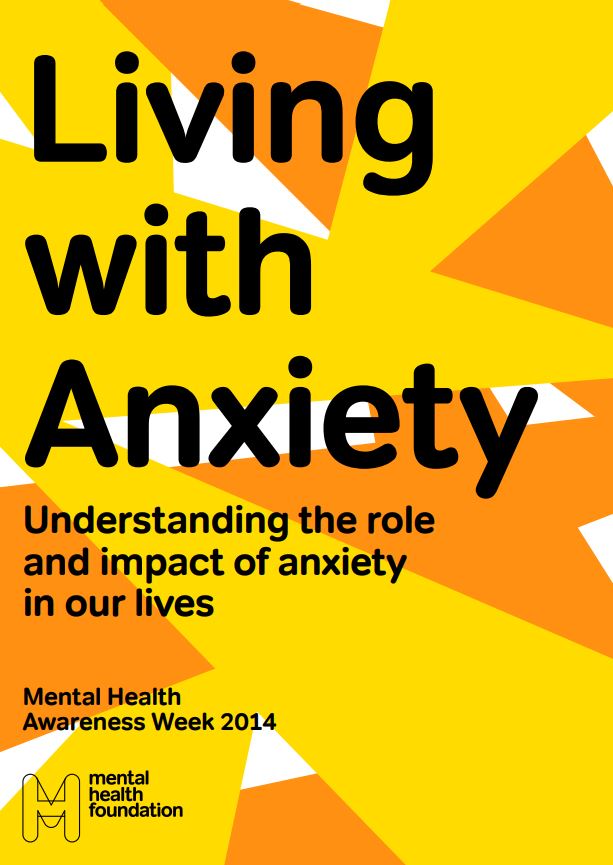Agoraphobia
Key points about agoraphobia
- Agoraphobia is a type of anxiety disorder where you feel extremely scared of situations or places that would be difficult to get away from or get help in.
- Agoraphobia varies from day to day. It doesn’t mean you panic every time you go to the supermarket or into a situation you have felt scared about before, but sometimes you do.
- As agoraphobia is a severe type of anxiety, many people with agoraphobia do have panic attacks.
- Agoraphobia can affect your life a lot, so it’s important that you get help.
- There are treatments that can make a difference.

Agoraphobia is a type of anxiety disorder in which you feel extremely scared of situations or places that would be difficult to get away from or get help in.
Although agoraphobia is often thought of as a fear of ‘open spaces’, it’s about:
- a fear of feeling panic when you think about being in a situation that would be hard or embarrassing to leave or to get help in, and
- the panic you feel when you are in that situation.
These fears can make you scared about leaving your home, using public transport or being in a public place. Those who suffer the most change their behaviour so much that they can’t leave the house.
Agoraphobia affects about 1.5 per cent of the population. Agoraphobia usually develops between the ages of 25 and 35 years and is usually a lifelong condition unless treated. Agoraphobia commonly occurs alongside other anxiety disorders or post-traumatic stress disorder (PTSD). Studies have suggested men and women are affected equally with agoraphobia.

Image credit: 123rf
While the cause of agoraphobia isn’t known, it’s more common in people who tend to be anxious or nervous. About two-thirds of people with panic disorder develop agoraphobia. Other factors that make it more likely you will develop agoraphobia include:
- trauma
- severe stress
- other mental illness, eg, depression or eating disorders
- drug or alcohol misuse
- a family history of anxiety or depression.
Your symptoms may be mild or severe. They can affect your body (physical), your mind (cognitive) and your behaviour.
Physical symptoms are are similar to the symptoms of a panic attack, such as:
- breathing quickly and taking shallow breaths
- your heart beating fast
- feeling sick in your stomach
- breaking out in a sweat
- pain in your chest
- feeling faint or dizzy.
Cognitive symptoms are thoughts that bad outcomes will happen (eg, having a panic attack) that would:
- make you look stupid
- make you feel embarrassed
- threaten your life by your heart stopping or you not being able to breathe
- mean you couldn’t escape without help from someone.
You may also have other fears, such as:
- not being able to cope without help
- being left alone at home
- a general feeling of anxiety or dread.
These symptoms can affect your behaviour so that you do things like:
- avoid situations that could lead to panic attacks, such as crowded places, public transport or queues
- become unable to leave the house for long periods of time
- need to be with someone you trust when you go out
- avoid being far away from home.
It’s important to contact your healthcare provider if you think you have the symptoms of agoraphobia. If you can’t manage to get to your healthcare provider, arrange to have a phone or telehealth consultation. Your healthcare provider will ask you to describe your symptoms, how often they occur and in what situations. Tell them as much as possible about what you’re feeling and thinking and how that limits what you do. They may do a physical check up to make sure your symptoms don’t have a physical cause.
Things that can make a difference include:
- learning about agoraphobia and the self-care techniques you can use to manage it (see below)
- psychological therapy
- medicine.
For most people, a combination of these will work best.
Psychological therapy
There are trained professionals who know about agoraphobia and how to help someone who is affected by it. They can provide you with support and help for working through any distressing thoughts and feelings you have. They can also support you to make positive changes in your life. For some people, it might be helpful to understand why your agoraphobia developed, and this may involve processing earlier trauma. For others this isn’t important or useful and the key is to focus on changing their thinking and behaviour.
Cognitive-behavioural therapy (CBT), a psychological therapy that largely focuses on overcoming unhelpful beliefs, has been shown to work well with agoraphobia. Sometimes, therapy will also involve desensitisation which is a gradual exposure to your fear of situations or places that would be difficult to get away from or get help in. This can be a very effective step in getting over your phobia. Don’t worry though – this only happens when you are ready and at a pace that is right for you.
Ask your healthcare provider for a referral or you can find a counsellor, therapist or psychologist(external link) yourself. If you can’t get out to see a counsellor or therapist, some people offer phone counselling. Phone Anxiety NZ 0800 ANXIETY (0800 269 4389) for a recommendation.
Medicines
Medicine such as a selective serotonin reuptake inhibitor (SSRI) is usually recommended. Sometimes benzodiazepines may be used together with relaxation techniques and psychological therapy, however it’s important to develop techniques to reduce anxiety, rather than relying on a medicine to make you feel relaxed. The choice of medicine will depend on your preference, response to previous medicines and consideration of possible side effects.
Selective serotonin reuptake inhibitors (SSRIs) are a type of antidepressant that have been found to be effective in treating mood disorders (eg, anxiety, panic attacks and obsessional thoughts). An SSRI called sertraline is a commonly used medicine for people with agoraphobia. Read more about sertraline.
Benzodiazepines have a calming, relaxing effect and a short course may be prescribed for severe flare-ups of panic-related symptoms. Benzodiazepines must be used for a short time only, as they are very addictive medicines. Ongoing use for longer than 2 to 4 weeks is not recommended. Read more about benzodiazepines.
Apps reviewed by Healthify
You may find it useful to look at some Mental health and wellbeing apps.
There’s a lot that you can do to care for yourself and reduce your symptoms.
- Tell the people you trust about your agoraphobia and stay in touch with them.
- It’s a good idea to keep getting out of the house as much as you can.
- You can do this with someone you trust supporting you, and build up to doing it by yourself over time. Let your support person know in advance that you might have to wait for a panic attack to pass, or even go home if it’s not working out.
- Learn how to reduce panic and anxiety through relaxation techniques and mindfulness.
- It’s important you practice these techniques regularly, so you’re comfortable using them when you feel panic symptoms building.
- Learn more about managing and improving your condition with resources listed below.
- Exercise can help. If you can go outside, walk each day, especially in a natural environment. If you are housebound, it’s still important to move as much as possible.
- A healthy diet supports you to manage your stress well. Limiting alcohol, nicotine and caffeine can also help.
- It’s important to get good quality sleep as well. Read more about sleep and how to sleep better.
These interviews offer insight into people's experiences of agoraphobia.
Video: Mike Chunn - Living with agoraphobia
This video may take a few moments to load.
In this interview, Mike Chunn, former Split Enz bass guitarist, describes his experience of living with agoraphobia for 18 years.
(The Nutters Club, NZ, 2017)
Video: Agoraphobia isn't just a fear of the outdoors
This video may take a few moments to load.
(Re:, NZ, 2018)
24/7 phone helpline 0800 ANXIETY (0800 269 4389).
If you can manage it, join a support group. Ask your healthcare provider, phone Healthline 0800 611 116 or Anxiety NZ 0800 ANXIETY (0800 269 4389) to see if there is one in your area. If you can’t go out to a group, look for an online forum and find one that works for you.
Overcoming agoraphobia(external link) Anxiety NZ
Phobias(external link) Mental Health Foundation, NZ
Find out how to tell if someone is struggling with their mental health(external link) BBC, UK, 2021
Panic course(external link) (online course), This Way Up, Australia
Overcoming panic and agoraphobia(external link) Online course, UK
Apps
Mental health and wellbeing apps
Brochures
A guide to talking therapies in NZ Te Pou, NZ
Apps/tools
Meditation and mindfulness apps
Overcoming panic (Just a Thought) course
References
- Living with anxiety – understanding the role and impact of anxiety in our lives(external link) Mental Health Foundation, UK, 2014
- Phobias(external link) Mental Health Foundation, NZ, 2022
- Agoraphobia Patient Info, UK, 2022
- Generalised anxiety disorder in adults BPAC, NZ, 2009
- Agoraphobia NHS Choices, UK, 2022
- Agoraphobia(external link) Psychology Today, NZ, 2021
Clinical pathways
Clinical practice guidelines for the treatment of panic disorder and agoraphobia(external link). Royal Australian and New Zealand College of Psychiatrists Australian and New Zealand, 2003
Agoraphobia(external link) Patient Info Professional References, UK, 2016
Resources
- Asmundson GJG, Taylor S, Smits JA. Panic disorder and agoraphobia – an overview and commentary on DSM-5 changes(external link). Depression & Anxiety. 2014 June; 31 (6): doi: 10.1002/da.22277.
- Generalised anxiety disorder in adults(external link). Best Practice Journal, 2009 Dec; 25.
- Clinical practice guidelines for the treatment of panic disorder and agoraphobia(external link). Royal Australian and New Zealand College of Psychiatrists Australian and New Zealand, 2003
Apps
Mental health and wellbeing - CBT apps
Mental health and wellbeing - goal setting, problem solving and motivation apps
Mental health and wellbeing - meditation and mindfulness apps.
Brochures

Mental Health Foundation, UK, 2014
Credits: Healthify editorial team. Healthify is brought to you by Health Navigator Charitable Trust.
Reviewed by: Dr Phoebe Hunt, Medical Officer, Northland
Last reviewed:





